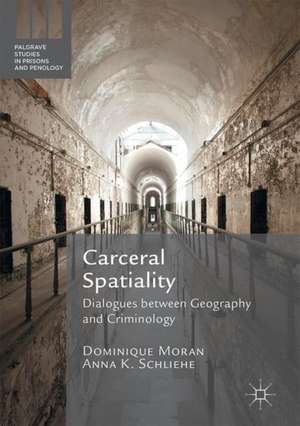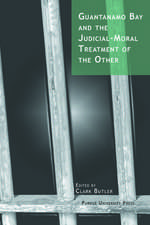Carceral Spatiality: Dialogues between Geography and Criminology: Palgrave Studies in Prisons and Penology
Editat de Dominique Moran, Anna K. Schlieheen Limba Engleză Hardback – aug 2017
Din seria Palgrave Studies in Prisons and Penology
-
 Preț: 188.02 lei
Preț: 188.02 lei - 20%
 Preț: 690.78 lei
Preț: 690.78 lei - 20%
 Preț: 1129.45 lei
Preț: 1129.45 lei -
 Preț: 352.56 lei
Preț: 352.56 lei - 18%
 Preț: 727.97 lei
Preț: 727.97 lei - 18%
 Preț: 788.90 lei
Preț: 788.90 lei -
 Preț: 394.51 lei
Preț: 394.51 lei -
 Preț: 331.94 lei
Preț: 331.94 lei - 18%
 Preț: 950.21 lei
Preț: 950.21 lei - 18%
 Preț: 2131.32 lei
Preț: 2131.32 lei - 15%
 Preț: 709.91 lei
Preț: 709.91 lei -
 Preț: 390.63 lei
Preț: 390.63 lei - 15%
 Preț: 585.08 lei
Preț: 585.08 lei - 18%
 Preț: 728.60 lei
Preț: 728.60 lei - 18%
 Preț: 994.72 lei
Preț: 994.72 lei - 15%
 Preț: 645.47 lei
Preț: 645.47 lei -
 Preț: 390.08 lei
Preț: 390.08 lei - 15%
 Preț: 644.95 lei
Preț: 644.95 lei - 15%
 Preț: 643.99 lei
Preț: 643.99 lei - 15%
 Preț: 647.92 lei
Preț: 647.92 lei - 15%
 Preț: 639.25 lei
Preț: 639.25 lei - 15%
 Preț: 696.50 lei
Preț: 696.50 lei - 18%
 Preț: 1113.58 lei
Preț: 1113.58 lei - 18%
 Preț: 782.42 lei
Preț: 782.42 lei - 15%
 Preț: 652.31 lei
Preț: 652.31 lei - 18%
 Preț: 1397.68 lei
Preț: 1397.68 lei - 18%
 Preț: 730.97 lei
Preț: 730.97 lei -
 Preț: 383.12 lei
Preț: 383.12 lei - 15%
 Preț: 644.95 lei
Preț: 644.95 lei - 15%
 Preț: 699.77 lei
Preț: 699.77 lei - 18%
 Preț: 731.73 lei
Preț: 731.73 lei - 18%
 Preț: 897.33 lei
Preț: 897.33 lei - 15%
 Preț: 644.95 lei
Preț: 644.95 lei - 15%
 Preț: 647.40 lei
Preț: 647.40 lei - 15%
 Preț: 642.68 lei
Preț: 642.68 lei
Preț: 893.40 lei
Preț vechi: 1089.51 lei
-18% Nou
Puncte Express: 1340
Preț estimativ în valută:
170.95€ • 178.94$ • 142.29£
170.95€ • 178.94$ • 142.29£
Carte tipărită la comandă
Livrare economică 31 martie-14 aprilie
Preluare comenzi: 021 569.72.76
Specificații
ISBN-13: 9781137560568
ISBN-10: 1137560568
Pagini: 300
Ilustrații: XI, 289 p. 12 illus.
Dimensiuni: 148 x 210 mm
Greutate: 0.51 kg
Ediția:1st ed. 2017
Editura: Palgrave Macmillan UK
Colecția Palgrave Macmillan
Seria Palgrave Studies in Prisons and Penology
Locul publicării:London, United Kingdom
ISBN-10: 1137560568
Pagini: 300
Ilustrații: XI, 289 p. 12 illus.
Dimensiuni: 148 x 210 mm
Greutate: 0.51 kg
Ediția:1st ed. 2017
Editura: Palgrave Macmillan UK
Colecția Palgrave Macmillan
Seria Palgrave Studies in Prisons and Penology
Locul publicării:London, United Kingdom
Cuprins
1. Introduction: Co-production and Carceral Spatiality; Dominique Moran and Anna Schliehe.- PART I: Mapping Beyond Carceral Identities.- 2. Entangled Identities Inside and Outside; Lorraine van Blerk.- 3. An Extended Social Relational Approach to Learning Disability Incarcerated; Caitlin Gormley.- 4. Towards a Feminist Carceral Geography? Of female Offenders and Prison Spaces; Anna Schliehe.- PART II: Moving Beyond Carceral Walls.- 5. Illusions of Utopia: When Prison Architects (Reluctantly) Play Tetris; David Scheer and Colin Lorne.- 6. The Artistic ‘Touch’: Moving Beyond Carceral Boundaries through Art by Offenders; Jennifer Turner.- 7. Exploring ‘betwixt and between’ in a Prison Visitors’ Centre and Beyond; Rebecca Foster.- PART III: Imagining Beyond Carceral Spaces.- 8. Tracing Memories in Border-Space; Clemens Bernardt, Bettina van Hoven and Paulus Huigen.- 9. Disavowing ‘the’ Prison; Sarah Armstrong and Andrew Jefferson.- 10. Conclusion: Reflections on Capturing the Carceral; Anna Schliehe and Dominique Moran
Notă biografică
Dominique Moran is Reader in Carceral Geography at the School of Geography, Earth and Environmental Sciences at the University of Birmingham, UK.
Anna K. Schliehe is Post-Doctoral Research Associate at the Prisons Research Centre at the University of Cambridge, UK.
Textul de pe ultima copertă
This edited collection speaks to and expands on existing debates around incarceration. Rather than focusing on the bricks and mortar of institutional spaces, this volume’s inventive engagements in ‘thinking through carcerality’ touch on more elusive concepts of identity, memory and internal – as well as physical – walls and bars. Edited by two human geographers, and positioned within a criminological context, this original collection draws together essays by geographers and criminologists with a keen interest in carceral studies. The authors stretch their disciplinary boundaries; tackling a range of contemporary literatures to engage in new conversations and raising important questions within current debates on incarceration. A highly interdisciplinary project, this edited collection will be of particular interest to scholars of the criminal justice system, social policy, and spatial carceral studies.
Caracteristici
Spans the disciplinary divide between criminology and geography, with particular attention to the maturing sub-field of carceral geography Includes cutting-edge contributions from a wide range of both scholars and practitioners Offers a truly international perspective, with a strong focus on Europe and the Global South












